- Home
- Scott Kenemore
Zen Of Zombie (Zen of Zombie Series) Page 2
Zen Of Zombie (Zen of Zombie Series) Read online
Page 2
In the language of a zombie, however, the word for “crisis” is also the word for “a decided lack of yummy humans to eat.” (The zombie word for “opportunity” is likewise synonymous with “a school bus full of defenseless children,” “a group of overconfident, naïve explorers,” and “a crowded country house with the road washed out and the phone lines disconnected from a storm.” ... but you probably could’ve guessed that.)
See, the zombie doesn’t draw the inference polite society might expect it to draw. It doesn’t think: “Gee, I’m on fire. I should really stop to put this out before continuing on my way.” It doesn’t think: “I have no arms and legs left, and inching myself along with my neck is really taking a while. Maybe I should just give up and let the other zombies have all the fun.” No! You’re not going to convince a zombie it’s time to give up and start pouting. It’s just not done. (Or not something done by zombies, anyway.) A zombie stops only when its own brain is destroyed or disconnected from the spinal cord. Only under similar circumstances should you consider giving up on yourself as an acceptable option.
Remember to think of the adaptable zombie when life throws you something you weren’t expecting. It doesn’t have to be a villager planting a flaming pitchfork in your chest, or a machine-gun assault by a top-secret federal anti-zombie agency. It can be an irritating foot fracture, being passed over for a promotion at work, or having your car repossessed. Sure, zombies don’t (usually) drive, but it isn’t difficult to guess what a zombie would do in that situation.
He’d shuffle right to the bus stop, and go to work all the same. And once at work, he would eat the head of his boss (despite an irritating foot fracture).
2
Play to Your Strengths (and Ignore Your Weaknesses)
Everybody has different strengths and weaknesses.
If there’s a lesson to be taken from this fact, it’s “use what you got.” It’s a lesson nobody’s learned better than a zombie.
The luckiest zombies are those with the good fortune to be reanimated directly after mortal life has departed from the body. These zombies, usually still wearing the clothes they were buried in (which, in the case of female zombies, almost always includes pearls and a hat), have the fortune to be mistaken for living humans. Occasionally, these lucky zombies are even mistaken for the particular living people they were before they died. The advantages of this are diverse and considerable. A zombie who appears to be simply a drunken or similarly incapacitated human being of sallow complexion has a much greater chance of gaining access to the places where living humans (and their correspondingly delicious brains) are to be found. Some of these highest-functioning zombies are even lucky enough to remember a word or two of human speech. (Usually these will be simple words and phrases like “hello,” “yes,” “no,” and “I am, in fact, a neurosurgeon. Now please let me closer to that succulent frontal lobe.”) These zombies are the millionaires, the professional athletes, the rock stars of the zombie world.
But as long as they remain appropriately humble, we have little reason to begrudge them their success. (Zombies are not covetous of one another’s good fortune. This is yet another trait we could stand to adopt from them.)
Other zombies (perhaps the majority fall into this category) are lucky enough to have all of their limbs and features, but cannot pass for living human beings. These zombies have deathly pale skin. Their grave-clothes are often generations old. Their fingernails and teeth are long and ragged. Their hair is unkempt and encrusted with soil. Still, these zombies are able to be mistaken for living humans at great distances or in the dark, and often use this fact to their advantage. These zombies can sometimes blend into crowds of inebriated people (such as at sporting events or rock concerts), and can pass unnoticed through inhabited areas on dark, rainy nights.
Zombie Tip:
A brain in the hand is worth two behind the hastily improvised zombie barricades.
Count your blessings, man. When something good comes your way, go ahead and enjoy it. Don’t forsake it in favor of what might be behind the next door. Cause it could be some kind of anti-zombie nerve gas the government has been working on, and then you’re just fucked.
Other zombies still are less lucky, yet manage as best they can. Zombies in this category are often missing arms or legs. Eyes, noses, and teeth are questionable. Baldness is common. Decomposition, to some degree, has already set in. These zombies are often called the most hideous because they still possess some visible similarity to a living human, but with the most jarring variations thereupon. These zombies induce fainting, vomiting, and the invocation of deities on sight. Tragically, they must exist in a world not designed for them—a world of staircases made for people with two legs, ladders for those with two arms, and voice-recognition software that is hard enough for a living human to use and damn-near impossible for a zombie’s rotted vocal cords to operate. These zombies can’t pass for human, and don’t try to. They win by paralyzing victims with fear. By being a glorious abattoir-on-parade. If someone faints at the sight of them, so much the easier. If a zombie’s wounds or half-decayed state is knee splittingly hilarious, then hey, keep laughing while the zombie gets that much closer, funny guy. Maybe these zombies don’t look much like people anymore, but the point is, you’re still getting eaten.
Any questions?
A final category of zombie may fairly be called the Most Decomposed Zombie. Some researchers have even wondered if these creations ought to count as “zombies” at all. Here you find the walking skeleton, no more than rags, tendons, and bright white bone glistening in the moonlight. Here you find the gelatinous humanoid mass, muddily rising from a grave in the bottom of a swamp and lurching toward land caked in leaves and vines. Here the brain, spinal cord, and gibbering skull, squirming along like a fish out of water. These zombies are not just un-human, but un-zombie-like as well. But fuck it, right? They’re still coming for you, and that’s the important thing. In fact, maybe that’s their advantage. These zombies aren’t trying to look like humans. They’re mud creatures, or fish, or skeletons, or fish skeletons. They’re not going to let you tell them they’re not zombies. You don’t “get” to tell them what they can or can’t be. They’re going to crawl or slither or drag themselves after you, and eat your quick-to-categorize brain before it can exclude them from anything else.
In short, the zombies (in all of their various forms) remind us that to be good at what you do, you don’t need to be “normal” by anyone’s standards but your own. No matter what hand God, or nature, or various artificial reanimating nerve agents have dealt you, you already have everything you need to effectively achieve your goals and follow your dreams.
3
I Will Choose Free Will
Don’t let anyone, or anything, tell you what to do.
When people pick on zombies by using them in analogies and comparative examples, they usually do so it ways that make zombies sound like automatons or robots that are largely unaware. Incorrect as it is, you’ll hear people say things like:
“Joe in accounting is such a zombie. He’s just going through the motions.”
-or-
“The prisoners are so beaten down they just stand around the exercise yard like zombies.”
-or-
“Find out what that guy’s weakness is, and we’ll use it to turn him into a zombie.”
-or even-
“I didn’t bother leaving the couch today. When the playoffs are on, I’m like a zombie.”
The problem with these examples is they mistake a zombie’s focus and drive for a kind of mindlessness. The idea that zombies find their existence a restraint or a prison is deeply misguided. In fact, nothing could be more distant from the truth.
Other self-help books love to talk about “breaking the chains” that constrain you, or “setting yourself free” from this or that vice. These books are usually written by dilettantes and dabblers in freedom. If you truly want to experience freedom—real, radical freedom—yo
u need to make the zombie your model. They are the freest creatures of all.
Acceptance and acculturation into society involves the relinquishing of certain freedoms. Nothing new here, right? I benefit from my citizenship, but the laws that protect me also restrain me. The police will prevent my enemies from murdering me, but they will also stop me if I want to murder my enemies. The government provides roads for me to drive on, but I have to pay taxes to build those roads. Yadda, yadda, yadda.
As other self-help books have previously noted, many people are surprised to find that this acculturation has extended even into their own minds.
Some examples are obvious. As much as I might hate my enemy, I don’t actually contemplate killing him. I think to myself “Killing him is not something I can do” because society has closed it off to me as an option. But in truth, I can by all means kill my enemy. Nothing physically prevents me from ringing his doorbell, and smacking him over the head with his heaviest lawn ornament as soon as he opens the door. Yet my acculturated brain tells me that this would result in my arrest, incarceration, and possible execution. Because of it, my brain removes it as a “lived” possibility I can actually pursue. While physically I can pursue it, I have removed that button from the keyboard of my mind.
Less extreme examples also illustrate the way we eliminate certain options from out list of possibilities.
When your alarm rings (at least on a weekday), you likely just get up and head for the shower, no matter how sleepy, or hungover, or under the weather you might be feeling. Your alarm doesn’t physically force you to rise (when you would very much prefer to stay in bed). Rather, you rise because you have given your alarm power over you.
And it’s not just alarm clocks.
Traffic lights. Work superiors. Court-appointed substance-abuse counselors.
All of these things get an automatic response from us because it saves time and because it’s easier than thinking it through.
In some cases, we don’t even think it through the first time. For example: “While it sure doesn’t sound like going to couples counseling once a week (and paying $50 for the privilege) is going to even begin to save a relationship this codependent and twisted, I told Karen I’d give it a chance. I don’t want to fight about it anymore, so I’ll just assume that if I reasoned it through, I’d elect to go.”
Before long, we’re walking fifteen minutes out of our way instead of just cutting straight across a lawn because we automatically give a KEEP OFF THE GRASS sign power over us.
Giving things power over it is not something a zombie does.
Of all entities everywhere (be they natural, supernatural, celestial, or something else), zombies may be the most free. With an existentialist flourish to make Jean-Paul Sartre blush, zombies realize they are truly able to do whatever they want, whenever they want. Zombies have noticed that no one can tell them what to do, and that the only limit on their actions is usually self-imposed.
A human thinks: “Even if I want to, I can’t kill my enemy. If I do that I’ll be shot at or jailed.”
A zombie thinks: “If I want to, I can eat that guy’s brain and get shot at or jailed.”
The impending consequence in this example is much the same for the zombie and the human. The important difference is that the human is so acculturated and constrained that he automatically opts out of what he really wants to do. The radically free zombie keeps everything on the table.
When a human says: “Can I do that?” He usually means something like: “Is this legal? Will I get in trouble? Is it permitted?”
A zombie who wonders if something is possible is concerned only with the physical logistics. A zombie might wonder: “Can I break down this military barrier? Can that fat kid outrun me? Can I get through that doorway with this spear sticking through my chest?”
But never: “Will I get in trouble if I break down this door? Will eating that fat kid be in bad taste? Is it a social faux pas to go indoors with a spear?”
Zombie Tip:
Remember that YOU have the power to change the world.
Not in any real, meaningful, geopolitical way, of course. But if you’re willing to scale things back just a bit, you’ll see that real change is possible when you work on a one-toone (brain-to-brain) level.
True, completely ignoring laws, conventions, and manners doesn’t make zombies any friends. Yet there is no evidence that it makes them more hated and feared than they already are. Would a zombie who took care not to block the box as it crossed an intersection in pursuit of a victim be any less terrifying (or any more deserving of mercy from the wellarmed)?
Zombies know they’re going to be attacked on sight anyway, so why not do whatever you want, right?
To put it simply, a zombie has discovered that it is possible not to concern oneself with whether something is “allowed,” or “legal,” or “in good taste.” There are many benefits to this. It makes zombies direct and effective, yes. But it also makes their defeat (or successful repulsing) a thing that must be tested each time.
A zombie defeat is never self-imposed.
A human army, for example, will usually surrender or retreat when facing an obviously superior foe. You’ll hear telling murmurings along the line, like:
“We can’t fight an army that large.”
-or-
“There’s no way we can try to hold off an army that outnumbers us 20 to 1!”
-or-
“It’s impossible to charge an enemy head-on when they’re so well fortified!”
The one thing these cowardly declamations have in common is that they insinuate a lack of possibility where possiblity clearly exists. If an army really wanted to, it could easily engage a large, well-fortified opponent that outnumbered it 20 to 1.
Actually, that’s just what zombie armies do.
It has already been noted that a benefit of zombie troops is their ability to fight to the last zombie. While human armies are quick to self-select that as an unacceptable ending to an engagement, zombies are free to say: “You know what? Screw it. I’m still charging. We’re outnumbered and encircled and they’re offering amnesty to all zombies, but I still get to choose what I want to do, and I choose to go down in a blaze of brain-gnashing glory.”
To make one final, but important, distinction, it must be noted that zombies are not (alas) invincible, and that should not be inferred from the above.
When a zombie chooses to ignore common sense and charge a medieval warrior-king with a flaming sword, that zombie may well find itself at that king’s feet with its head separated from its body. Zombies who choose not to give a sign power over themselves, even when that sign reads DANGER: MINE-FIELD, are no less exploded because of it.
The point is not that zombies’ radical freedom allows them to do anything. Instead, it’s that zombies don’t let others force them to control themselves. If you want a zombie not to walk on the grass, you’ll have to pull out a shotgun and blow its head off. Humans might do what you want them to just because you made a KEEP OFF THE GRASS sign, but zombies don’t work that way.
Sorry bub, but you better start shootin’.
4
Succeed as a Corporate Zombie
Perhaps no single aspect of life can take as much from the zombie as that of the working world. White-collar or blue-collar, whatever your occupation, if you want to get ahead in your career, look to our friend the zombie.
Most workers arrive at the job site each day with a set of “skills” that end up doing more harm than good. They “think critically.” They have “listening skills.” They “keep an open mind” and “seek input from all sources” before making a decision.
And (imagine it!) these same people wonder why they don’t get promoted.
Allow me to let you in on a little secret, Mr. Jack-Welchwannabe ... The qualities that allow a worker to get ahead in the business world are the same ones that allow a zombie to get a head in an abandoned shopping mall: Focus, drive, and determination.
Whether your goal is to one day give orders from the conference-room table or just to get through another day of mindless repetition on the factory floor, make a zombie your model and you just can’t fail!
To see just how turned-around on the subject most people are, let’s take a typical fresh-faced management trainee on his first day at work. He’s got an empty briefcase, a brand new $1,000 suit, an Ivy-League MBA, and a head full of the latest corporate synergies, schematics, and business plans.

 Lake of Darkness
Lake of Darkness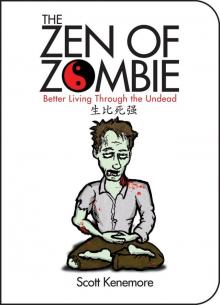 The Zen of Zombie
The Zen of Zombie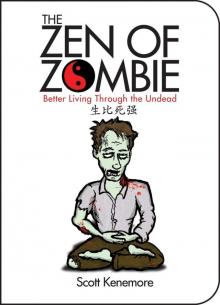 Zen Of Zombie (Zen of Zombie Series)
Zen Of Zombie (Zen of Zombie Series)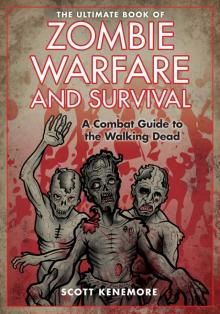 The Ultimate Book of Zombie Warfare and Survival
The Ultimate Book of Zombie Warfare and Survival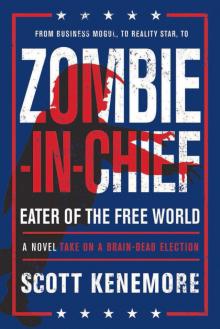 Zombie-in-Chief
Zombie-in-Chief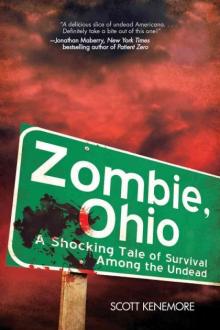 Zombie, Ohio
Zombie, Ohio Zombie, Illinois
Zombie, Illinois Zombie, Indiana
Zombie, Indiana